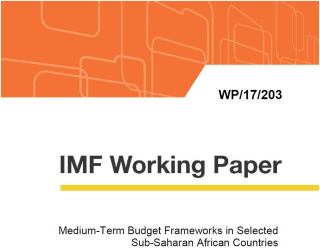Posted by Taz Chaponda and Richard Allen[1]
Medium-term budget frameworks (MTBFs) have established a strong track record in advanced countries, but how do they fare in countries with much weaker budgeting and governance systems? To what extent do they contribute to the preparation of macro-economic and fiscal projections that are more reliable, budgets that are more credible, and more broadly to better fiscal policies?
To examine these questions, a new IMF Working Paper focuses on the performance of MTBFs in six countries––Kenya, Namibia, South Africa, Tanzania, Uganda, and Zambia. More than 15 years ago, these countries, and many others in sub-Saharan Africa embarked on a program of budgetary reform, an important element of which was an MTBF. The working paper assesses the effectiveness of MTBFs in achieving improved fiscal discipline, resource allocation, and certainty of funding, as well as wider economic and social development goals.
The paper finds that, in many African countries, early successes in introducing an MTBF were not sustained, and budgetary outcomes did not improve, partly for technical reasons, such as poor data and inadequate forecasting methodologies, but also because the reforms were largely driven by external development partners, and lacked internal political support. Even where the reforms have genuinely taken root institutionally, the full benefits of an MTBF have remained largely elusive.
The paper argues that the establishment of MTBFs in the six countries was an important reform but has yet to deliver its potential benefits. One reason given for the lack of progress is the failure of many countries to improve the credibility of their macroeconomic and fiscal forecasts. This is shown by comparing the annual and medium-term forecast errors on key macroeconomic indicators that underpin budget preparation, as well as the resulting revenue and expenditure estimates.
The paper introduces a new way of analyzing MTBFs by pointing to the existence of different stages of MTBF development. It presents four stylized phases, representing different levels of capability of the ministry of finance’s central budget office and its work on macro-fiscal forecasting and analysis. Each phase is described across 20 different characteristics that are important pre-requisites of an effective MTBF. These phases may be summarized as follows:
- Phase I (“Pre-MTBF”) is characterized by a budget system that has no meaningful multi-year perspective and effectively produces an annual budget based on traditional line items.
- Phase II (“Elementary MTBF”) is characterized by a basic medium-term expenditure planning framework that has some elements of top-down fiscal planning and bottom-up costing of policies, but whose expenditure ceilings are indicative, and the link between planning and resource allocation is tenuous.
- Phase III (“Maturing MTBF”) is characterized by an established MTBF with a direct and credible link between planning and budgeting that flows from a sound medium-term macro-fiscal framework. Budget ceilings are effective and binding.
- Phase IV (“Advanced MTBF”) is characterized by a mature and effective MTBF with a strong performance orientation, reinforced by regular spending review.
To make the transition from one phase to the next, developing countries are advised to focus on building their capability in macro-fiscal forecasting and analysis, and in improving the credibility of the annual budget process. Initially, phase I countries should focus attention on improving the basic processes of annual budgeting, which continue to perform poorly. Similarly, Phase II countries should focus on the fundamental aspects of an MTBF framework rather than moving too quickly to the more advanced features present in Phases III and IV.
To implement an MTBF, there also needs to be a step-change in the development of medium- and long-term fiscal policy scenarios, which in many more advanced countries incorporate a numerical fiscal rule. The accuracy and reliability of macro-fiscal forecasts must improve significantly to allow the authorities to table a credible medium-term fiscal framework.
Once the MTFF has been introduced, the authorities should focus on preparing more realistic and reliable estimates of the overall resource envelope for the annual budget and individual spending ceilings for line ministries. These improvements should enable the link between the planning and budgeting functions to be strengthened. At this stage, depending on a country’s institutional capacity, features of the more advanced MTBF systems can also be adopted including multi-year expenditure ceilings, planning margins, and procedural fiscal rules.
Essential to the transition from one level to the next is the existence of an institutional framework that allows the cabinet to engage with officials during budget preparation. Higher levels of political engagement and support will usually lead to a more resolute reform path. The transition to an improved annual budget process and a more effective MTBF also requires a step change in the staffing and capability of the ministry of finance (especially its budget office and macro-fiscal unit).
The paper concludes that many countries in Africa have yet to graduate from the “pre-MTBF” or “elementary MTBF” phases, with only a handful of countries having made the transition into the “maturing” stage. This finding suggests that the recent focus of technical assistance in African countries on more advanced features of budgeting, such as program-based budgets, could well be misplaced. For many countries, in Africa, but also in other developing countries, a return to basic budget principles and practices is required. In practice, this means that reformers should identify broadly which stage a country has reached and then pursue the most appropriate steps consistent with the institutional capacity of that country.
[1] Taz Chaponda is a Senior Economist, PFM I Division, Fiscal Affairs Department, IMF; and Richard Allen is a Visiting Scholar in the Fiscal Affairs Department.
Note: The posts on the IMF PFM Blog should not be reported as representing the views of the IMF. The views expressed are those of the authors and do not necessarily represent those of the IMF or IMF policy.






